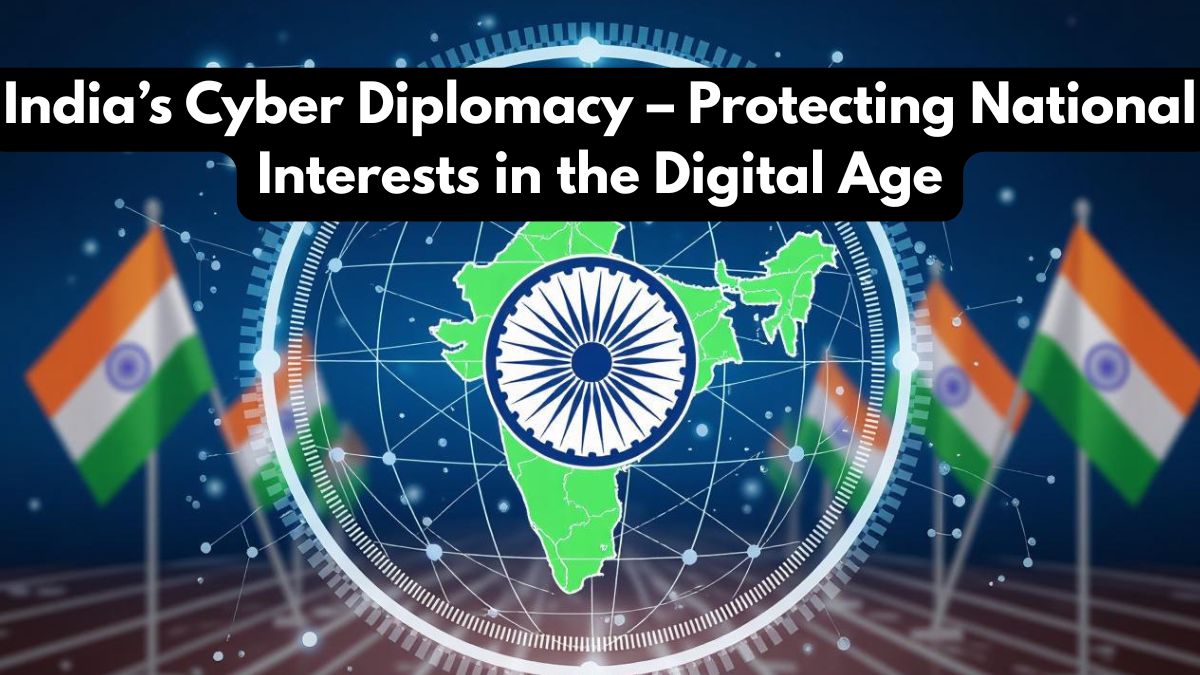In today’s interconnected world, cyberspace has become as crucial as land, sea, and air in matters of national security. The rise of digital threats, from cyber espionage to ransomware, has made India Cyber Diplomacy a key element of the nation’s foreign and security policy. With growing digital dependence, it is no longer enough to secure borders; countries must also secure their digital frontiers. By combining international partnerships with strong domestic frameworks, India is using Digital Security Policy to safeguard its national interests while positioning itself as a global leader in cyber governance.

The Growing Need for Cyber Diplomacy
As India emerges as a digital powerhouse, threats to critical infrastructure, financial systems, and government networks are also rising. The role of India Cyber Diplomacy has grown to include not just defense but also collaboration with global partners to combat cross-border cybercrime.
Key factors driving this need include:
- Rising cyberattacks on financial institutions and energy grids
- Increased geopolitical tensions spilling into cyberspace
- The growth of digital trade and data flows
- International concerns around data privacy and sovereignty
By aligning with global frameworks and creating a robust Digital Security Policy, India ensures its digital infrastructure remains resilient against such challenges.
India’s Approach to Cyber Diplomacy
India Cyber Diplomacy involves a multi-pronged strategy combining international cooperation, domestic policy frameworks, and capacity building. The government actively engages in global forums like the United Nations Group of Governmental Experts (UNGGE) to shape norms for responsible state behavior in cyberspace.
Domestically, Digital Security Policy initiatives are being strengthened through programs such as:
- National Cyber Security Policy (NCSP) updates
- Public-private partnerships for cyber awareness
- Establishment of Cyber Emergency Response Teams
- Digital literacy programs for safe internet practices
This balanced approach ensures India can defend itself while contributing to international digital stability.
Table: Key Elements of India’s Digital Security Policy
| Element | Description | Impact on Cyber Diplomacy |
|---|---|---|
| Critical Infrastructure Safety | Protecting power grids, telecom, and finance | Builds trust with global partners |
| Cybercrime Prevention | Tackling hacking, phishing, and ransomware | Strengthens global law enforcement ties |
| Data Protection Laws | Ensuring privacy and secure data governance | Aligns with international digital standards |
| Capacity Building | Training experts and digital workforce | Enhances global collaboration |
| International Cooperation | Agreements with nations and multilateral orgs | Expands scope of India Cyber Diplomacy |
This table highlights how Digital Security Policy not only strengthens India’s domestic defense but also supports its cyber diplomacy goals globally.
Challenges Ahead
Despite progress, challenges remain. Cyber sovereignty, data localization, and global disagreements over internet governance can complicate India Cyber Diplomacy efforts. Additionally, the rapid pace of technological change makes it difficult to keep Digital Security Policy updated in real time. Addressing these issues requires ongoing dialogue, global collaboration, and investment in research and infrastructure.
Conclusion
In an era where digital vulnerabilities can have real-world consequences, India Cyber Diplomacy is vital for protecting national security and shaping international norms. Backed by a comprehensive Digital Security Policy, India is building trust with allies, defending against cyber threats, and leading in global discussions on digital governance. By strengthening both domestic resilience and international collaboration, India ensures that its digital future is secure, inclusive, and globally respected.
FAQs
What is India Cyber Diplomacy?
It refers to India’s efforts to protect national interests in cyberspace through international cooperation, policy frameworks, and cyber defense strategies.
How does Digital Security Policy help India?
Digital Security Policy ensures that India’s digital infrastructure, data, and online systems remain protected against cyberattacks while supporting global partnerships.
Why is cyber diplomacy important today?
Because cyber threats cross borders, requiring international collaboration to combat cybercrime, espionage, and digital terrorism.
What are India’s main initiatives in Digital Security Policy?
Key initiatives include updated cybersecurity policies, cyber emergency response teams, and public-private partnerships for awareness.
What challenges does India face in cyber diplomacy?
Challenges include balancing cyber sovereignty with global norms, keeping up with rapid tech changes, and addressing geopolitical tensions in cyberspace.
Click here to know more.